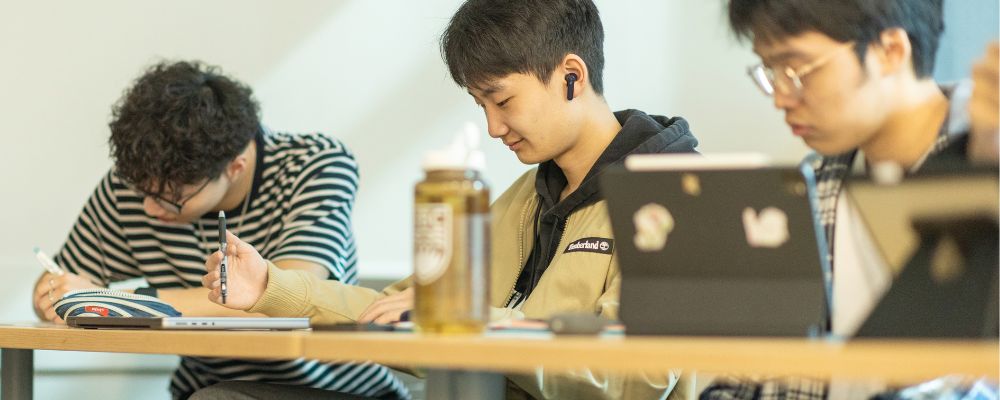English as an Additional Language Learning Lab

Designed to support English as an additional language (EAL) teaching and learning in the Okanagan School of Education, the EAL Learning Lab provides a space to bring together theory, research, and practice to create meaningful experiences for students and scholarly insights for educators.
As such, the EAL Learning Lab is a facilitated learning environment for the English Foundation Program and related courses, a pilot location for developing Open Educational Resources (OER), a research site for graduate students and faculty members, a creative area for professional development, and a community field experience opportunity for teacher candidates.
Research
The English as an additional language (EAL) Learning Lab is a hub for research into EAL teaching and learning for faculty and graduate students in the Okanagan School of Education (OSE). It is a home for scholarly inquiry into EAL teaching and learning that borrows from and welcomes a wide range of methodological and research approaches to examine questions related to EAL teaching and learning with the goal of strengthening educational practice and fostering the potential of students learning an additional language.
Some of the EAL Learning Lab’s current research projects are related to exploring the impact of English for academic purposes (EAP) program participation on undergraduate experiences, understanding additional language socialization in web-based and virtual environments, developing and evaluating open educational resources for EAL learners, identifying the ideal elements of short-term study abroad programs for EAL learners, and examining photovoice methods for capturing EAP student understandings of culture and place.
Landry, M. H. (2023). The development of intercultural communicative competence through online modules in an English for academic purposes program: Understanding the multiple layers of additional language socialization at play in a post-secondary context. [PhD dissertation, University of British Columbia]. UBC Theses and Dissertations. https://doi.org/10.14288/1.0435179
Douglas, S. R., Landry, M. H., Doe, C., & Cheng, L. (2022). English for academic purposes student reflections: Factors related to their additional language socialization at a Canadian university. TESL Canada Journal, 39(1), 1–23. https://doi.org/10.18806/tesl.v39i1/1373
Wiebe, K. L. (2022). Self taught: A case study of successful self-directed strategies, practices, and affordances used by newcomers engaged in English as an additional language learning in the workplace. [Master’s thesis, University of British Columbia]. UBC Theses and Dissertations. https://doi.org/10.14288/1.0417271
Douglas, S. R., & Landry, M. H. (2021). English for academic purposes programs: Key trends across Canadian universities. Comparative and International Education / Éducation comparée et international 50(1), 49–73. https://doi.org/10.5206/cieeci.v50i1.10925
Scott, R. (2021). The perceived benefits of using English as an additional language learning materials created according to a principled framework. [Master’s thesis, University of British Columbia]. UBC Theses and Dissertations. https://doi.org/10.14288/1.0401461
Douglas S.R., Campbell, R., Scott R. (2021). Encountered imagery: An English for academic purposes photovoice project. TESOL Journal, 12(2), e573, 1–6. https://doi.org/10.1002/tesj.573
Douglas, S. R. (2020). Counterfactual understandings: What Japanese undergraduate students wish they had known before a short-term study abroad experience. TESL-EJ, 23(4). 1–19. http://tesl-ej.org/pdf/ej92/a2.pdf
Open Educational Resources
These Open Educational Resources (OER) are designed for students learning English as an additional language (EAL) in an English for academic purposes (EAP) program.

English Foundation Program
The English Foundation Program is an innovative and credit-bearing program providing university admission to students who meet all academic requirements for a UBCO undergraduate degree, yet who do not meet UBC’s English Language Admission Standard.

Short-Term EAL Programs
We offer customizable non-credit short-term English as an additional language (EAL) programs for groups of post-secondary students and adult professionals who want to develop their EAL skills at a Canadian university.

Teaching English and Additional Languages Certificate
We’ve launched a newly revised Teaching English and Additional Languages (TEAL) Certificate. The certificate is designed to prepare students who are new to teaching as well as offer professional development for current teachers or those who have previous experience working with additional language learners in Canada or abroad.


Message from the Director of English as an Additional Language Programs
Welcome to the Okanagan School of Education’s EAL Learning Lab webpage. Here you will find information on the innovative research, materials writing, curriculum development, and instruction taking place to develop and grow the field of EAL teaching and learning in adult and post-secondary contexts. It is a hub for students to realise their linguistic potential and for scholar-practitioners to hone their craft while engaging in theory building, knowledge creation, and educational endeavour.
– Dr. Scott Douglas, Associate Professor, Okanagan School of Education


